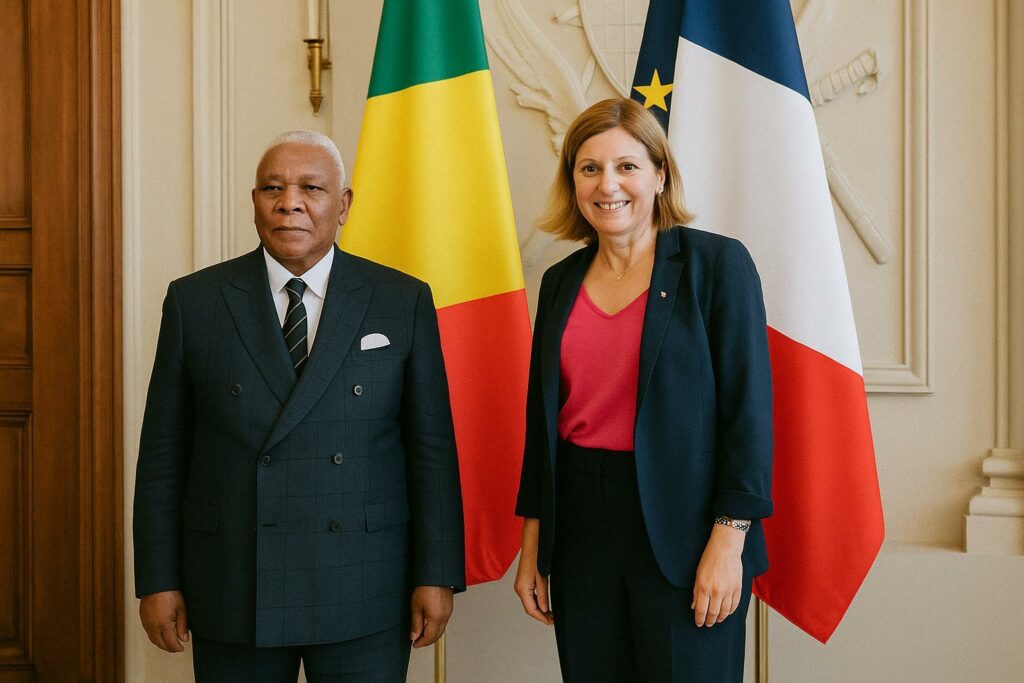Francophone Diplomacy as a Convergence Platform
The ornate Salle Lamartine, temporarily transformed into a hub of Francophone diplomacy, offered a symbolically dense backdrop for the dialogue between Isidore Mvouba and Yaël Braun-Pivet. Both Speakers framed their encounter as a natural extension of the shared linguistic and cultural space curated by the Assemblée parlementaire de la Francophonie, whose golden-jubilee session convened legislators from five continents (APF communique, July 2024). In private remarks later relayed to journalists, Mvouba described the APF as a “strategic amplifier of soft-power synergies” uniting Brazzaville and Paris. Braun-Pivet echoed the sentiment, arguing that robust parliamentary channels can “temper the centrifugal pressures” affecting contemporary geopolitics.
Toward a Modernised Memorandum of Understanding
Central to the discussions was the revival of a dormant protocol of cooperation first envisaged in the early 2000s yet never fully formalised. Senior aides confirm that the two Speakers mandated their respective secretaries-general to draft a modernised memorandum of understanding designed to institutionalise joint committees, reciprocal secondments of staff, and an annual review of bilateral commitments. Observers within the APF secretariat underscore that such instruments often translate lofty rhetoric into actionable agendas, citing the Franco-Moroccan parliamentary memorandum of 2022 as a precedent (Le Monde, 6 July 2024).
For Brazzaville, codifying the relationship promises operational dividends. Congolese parliamentary counsellors point to challenges in legislative drafting, impact assessment, and archival management that could benefit from French technical mentorship. Paris, for its part, views the arrangement as a conduit for advancing policy dialogue on climate finance and maritime security in the Gulf of Guinea, areas where Congo-Brazzaville’s regional convening power is increasingly acknowledged.
Energy, Ports, and Environmental Vigilance
The parliamentary track dovetails with presidential commitments announced during President Denis Sassou Nguesso’s working visit to Paris in May 2024. Chief among them is a partnership to overhaul the Congolese power grid, leveraging French expertise in smart-grid deployment and renewable integration. The Assemblies agreed to establish a bicameral monitoring mechanism to scrutinise disbursement schedules and technical benchmarks—an innovation hailed by an Élysée official as “proof of legislative diplomacy’s concrete utility” (AFP, 8 May 2024).
Equally consequential is the emerging alliance between the Port Autonome de Pointe-Noire and the Seine Axis harbours of Le Havre and Rouen. Parliamentarians envisage joint hearings involving port authorities, customs services, and private operators to facilitate harmonised regulatory norms. Such scrutiny is expected to accelerate container-throughput growth and buttress Congo’s ambition to serve as a multimodal gateway for Central Africa.
A third vector of cooperation finds expression in the planned Brazzaville Academy for Combating Environmental Crime. With Central African rainforests assuming global salience as carbon sinks, the academy will train magistrates, gendarmes, and park rangers in evidence collection and cross-border legal cooperation. French legislators offered to provide technical trainers from the Gendarmerie’s environmental unit, while Congolese deputies floated the idea of integrating local universities into the curriculum.
Knowledge Infrastructure and Symbolic Diplomacy
In a gesture laden with both symbolism and policy foresight, Speaker Mvouba renewed his invitation for Speaker Braun-Pivet to inaugurate a future parliamentary library in Brazzaville. The proposed facility would host multipurpose reading rooms, digitisation labs, and a Francophone research centre. French assistance could range from the donation of surplus parliamentary collections to capacity-building seminars for Congolese librarians. Analysts note that knowledge infrastructure often exerts a slow-burn impact on legislative quality by broadening access to comparative jurisprudence and international benchmarks.
The diplomatic theatre extended to ceremonial niceties. Mvouba’s inscription in the French National Assembly’s Golden Book—traditionally reserved for visiting heads of state or eminent parliamentarians—underscored the esteem accorded to the Congolese delegation. Photographs of the signing circulated widely on Congolese social media, sparking commentary on the symbolic parity achieved within the bilateral relationship.
Envisaging a Joint Parliamentary Horizon
Both Speakers concur that sustained oversight, rather than episodic summitry, will determine the success of the ambitious roadmap unveiled in Paris. A preliminary calendar foresees mutual visits of specialised committees on energy, finance, and environmental governance before the next ordinary session of the Congolese National Assembly. Interparliamentary friendship groups are already drafting questionnaires for line ministries, an exercise designed to inject empirical rigour into subsequent debates.
Diplomatic observers caution, however, that tangible progress will hinge on adequate budgetary allocations and bureaucratic follow-through on both sides of the Equator. Yet the prevailing mood among delegates remains cautiously optimistic. The French assembly’s director of international relations framed the outlook succinctly: “Our two legislatures have moved beyond protocol toward a methodology of shared problem-solving.” In the current climate of geopolitical fragmentation, such steady incrementalism may prove the most durable currency of statecraft.

